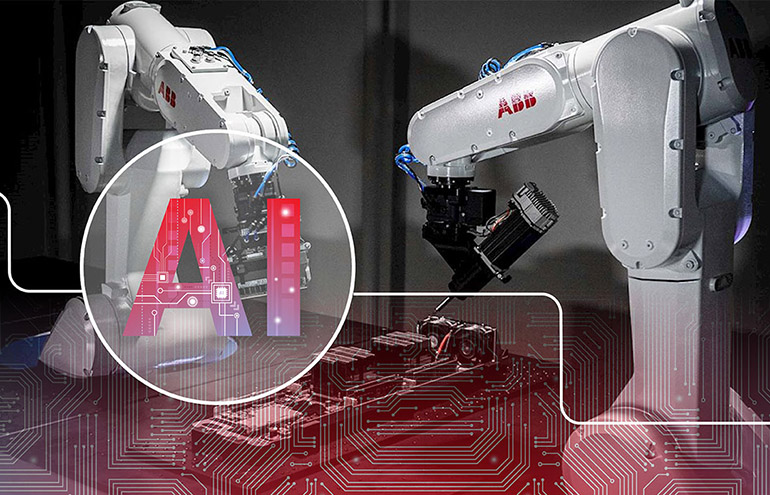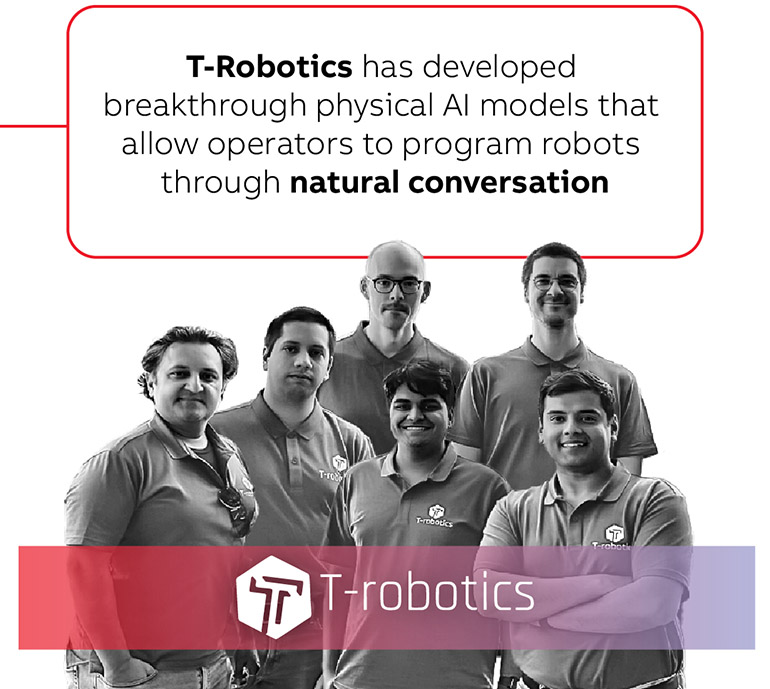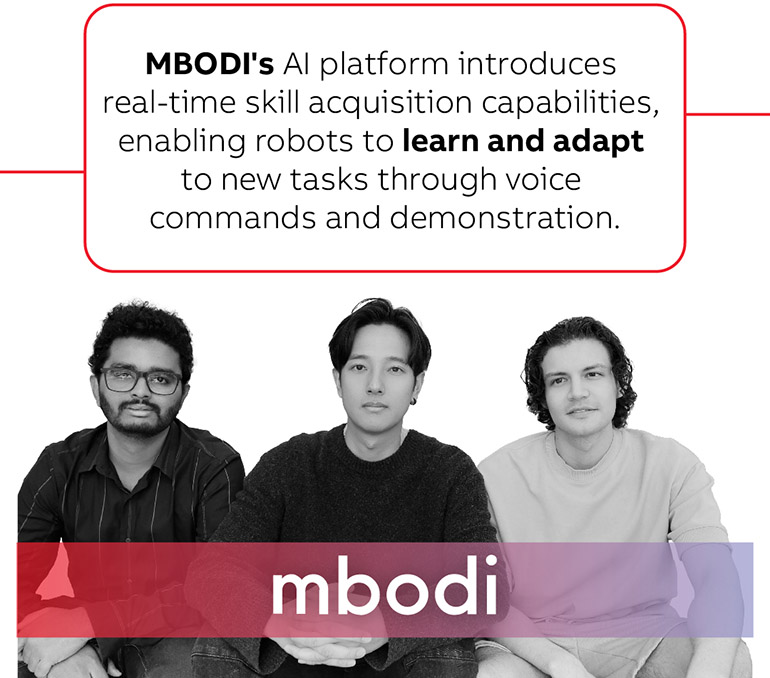
ABBs is working with T-Robotics and Mbodi to make robots more autonomous, intuitive, adaptive, and efficient. Source: ABB Robotics
Artificial intelligence promises to make industrial robots smarter and easier to use, but innovators need help getting them there. ABB Robotics today named Mbodi and T-Robotics the winners of its 2024 ABB Robotics AI Startup Challenge. The company picked the two startups from more than 100 global applicants, with 15 chosen to give pitches and five to give MVP proposals.
“Today’s manufacturing challenges demand solutions that combine simplicity with sophisticated AI capabilities,” stated Marc Segura, president of ABB Robotics. “T-Robotics and Mbodi demonstrated groundbreaking innovations, and by collaborating with both, we will accelerate the development of more intuitive, adaptable, and easier-to-use robotic solutions that will make business more efficient, flexible, and resilient.”
“For this challenge, we wanted to explore natural language interfaces and enabling robots to plan autonomously,” he told The Robot Report. “We’re looking at a wider domain rather than dexterous picking or navigation or technical KPIs [key performance indicators] for each. We wanted startups at a high technology readiness level [TRL] that are ready to go to market.”
Both winners will receive $30,000 in project funding and will collaborate directly with ABB’s technology experts. Each will also receive a six-month membership to SynerLeap, ABB’s startup accelerator.
“We know our customers’ pains and what they want for performance, safety, and ROI,” said Segura. “The generative AI tsunami involves a lot of iterations. We want to bring startups with core competences across the bridge to viable products.”
Both T-Robotics and Mbodi.ai said they expect to launch their first commercial applications with ABB in the U.S. in 2025.
 Register today to save 40% on conference passes!
Register today to save 40% on conference passes!
T-Robotics works on talking to robots
“Traditionally, you’d program a task like loading a CNC machine with a wizard or hard-code it,” Segura said. “With T-Robotics’ technology, you can teach the scene, use a visual interface to tell the robot to go to a tote and pick a gear, and if the door is closed, to open it.”
T-Robotics has developed physical AI models and a natural language interface for creating robot instructions with industry-specific skill models. The startup, which has offices in San Francisco and Trondheim, Norway, said this approach could significantly reduce programming time while ensuring optimal performance across various manufacturing scenarios.
T-Robotics today announced that it has raised $5.4 million in seed funding. It plans to use the capital to expand its operations in Europe and the U.S.
“Billions of dollars are spent developing humanoid robots, but the real workhorses—the 4.3 million robotic arms already in use and the half-million produced annually—are still underutilized and haven’t benefited from the latest AI advancements,” said Asad Tirmizi, co-founder and CEO of T-Robotics. “For decades, industrial robots have required complex programming in controlled environments. Yet, they often fail and perform limited tasks for only a few industries.”
“We believe single-purpose robots will continue to play a key role in industry,” he added. “By providing pre-trained AI skills that allow them to better understand the task they have to perform, we will create more intelligent, productive robotic partners.”
“By using generative AI and natural language, the system can understand semantics,” said Segura. “Then, by going to a more deterministic, introspective decision tree, we can get more accuracy, which is important for safety. We’re looking at complementary approaches.”

Source: ABB Robotics
Mbodi developing ability to execute tasks
Mbodi’s AI platform is more about executing skills, noted Segura. It uses transformers and an agentic infrastructure to allow robots to learn and adapt to new tasks on the fly in minutes through written and spoken natural language and demonstration.
The New York-based company said this technology represents a major advance in making automation accessible to businesses of all sizes, particularly those seeking flexibility for high-mix, low-volume production environments.
“We’re augmenting the industrial robotics experience through cutting-edge generative AI that fulfils evolving customer needs,” said Sebastian Peralta, a former Google engineer and co-founder and CEO of Mbodi. “As an industrial leader, ABB’s enthusiasm for disruptive technologies like ours will be instrumental in driving this transformation.”
“We’re not shooting for the moon,” said Segura. “We believe an agentic architecture will enable one application in a domain. For example, rather than train a neural network in electronics assembly, we want to enable the manufacturer to tell a robot to bend wires and put them on a specific object.”
“It’s also important to have vision plus tactile sensing for end-to-end training of robot skills with imitation,” he said. “Rather than build a robot that can do all the things to clean a hotel room, we’re looking at an atomic approach.”
Mbodi said that it expects vision language action models (VLAs) to eventually help robots generalize when used with existing technologies such as machine vision and cloud computing.

Source: ABB Robotics
ABB collaborates on paths to practical AI
ABB said it supports startup engagement, collaboration and investment through ABB Robotics & Automation Ventures (ABB RA Ventures). The initiative applies robotics industry expertise to engage, collaborate with, and invest in early-stage companies of strategic relevance globally.
“The disruptive potential of generative AI in robotics is vast but requires focused scrutiny,” Segura observed. “By focusing on three pivotal areas — natural language programming, skill learning, and autonomous decision-making — we identified two key solutions that position us to accelerate AI-driven, market-ready industrial products.”
The ABB Robotics AI Startup Challenge did not require a specific brand or model, but MVPs could use ABB’s Robot Studio on OmniCore for optimal cloud-based control and collaboration, Segura explained.
The challenge was part of the automation provider‘s wider Innovation Ecosystem. ABB said it partners with businesses to accelerate innovation and bring new products to market, advancing its mission to create a more sustainable and productive future.
“We have a framework with stakeholders, startups, and challenges around specific topics. ABB engages with large and small companies that have application expertise,” said Segura. “For picking, Covariant won our first challenge, and for visual SLAM, we got to know Sevensense, which ABB acquired.”
“There’s real demand from our customers to lower the cost and complexity of automating,” he added. “Generative AI can unlock making robots more capable. Lowering costs and making it easier for robots to do things are parallel efforts.”